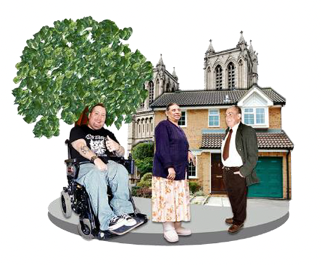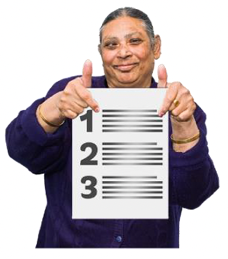Democracy Matters Phase 2 Consultation: Easy Read
Easy read version of the Democracy Matters Phase 2 discussion document containing questions for communities to consider about future scenarios for local decision making in different settings. Have your say on local communities deciding their own future.
Democracy Matters Consultation - Easy Read
Phase 2
Your Community.
Your Ideas.
Your Future.
Tell us what you think.
What is Democracy Matters?

Democracy Matters is part of the Local Governance Review.

Governance is the way that rules and systems are organised and put into place.
Usually this is done by people in power.

The Local Governance Review looks at how power, responsibility and resources are shared with local government and different communities.

Resources are money, staff and materials that are needed to do work.

A community of place is a group of people who live in the same area.
A community of interest is a group of people who share similar experiences, like disabled people, or black and minority ethnic people.
The journey so far.

The first phase of the review was in 2018 with findings published in 2019.

Lots of people all over Scotland were asked what they thought about:
- Being involved in making decisions about their community.
- If they want their community to have more control over some decisions.
- The different types and sizes of communities.
- What needs to change for communities to have more power.

These were called Democracy Matters conversations.

Democracy means everyone hasan equal say in how decisions are made.

Democracy Matters conversations involved people from all backgrounds and experiences.

The things people said were put in a document called 'Community-level decision-making: an analysis of responses to Democracy Matters'

Scotland's public sector leaders also gave ideas on how power, resources and responsibilities should be shared in Scotland.

Public sector organisations are run by the government.
They provide goods and services for the community and do not make any profit.

The Scottish Government, local government and public sector leaders agree.
They think decisions about local things should be made by local communities and organisations when that is possible.

Communities work best when they are involved in making local decisions.
They need to have control over
decisions that will affect their lives.
There needs to be change in how Scotland is governed to make that happen.

Democracy Matters conversations gave ideas about:
- what types of changes need to be made.
- how people from all backgrounds and experiences can be involved.
What we are asking people to do.
This document is about Phase 2 of Democracy Matters.

We want people to have conversations in their communities to answer the questions in this document.
We want you to think about a different democratic future and tell us if it is what your community needs and wants.

Groups can meet more than once to answer the questions.

Tell us what you think about the democratic future described in this document and give us your ideas.
What will we do with what you tell us?
We will think about what you tell us in the Democracy Matters Phase 2 conversations.
We will listen to how you want things to change.

We will look at how some decisions about Scotland's services could be made closer to the people they affect.

Communities have the right to have real power.
It will be complicated to change how powers and resources are shared.
People told us we need to work with them and take time to get it right.

The changes must work for everyone.
We will ask people in different places to look at the new plans we come up with and tell us how to make them better.
We could use Citizen's Juries to do this.
Citizen's Juries are groups of people who represent an area.

A different democratic future.

We have made up three communities to show how sharing power and resources could work in different places.
They are there to help you imagine the future we describe.

Think about your own community when answering the questions.
Tell us if this type of democratic future could make a difference in your community.
1. Christietown.

Christietown is a small town.
It used to be a successful town with lots of money.

It lost a lot of its factories, shops and skilled workers.

People want new ways to give everyone the same opportunities and make the town successful again.

There is a new sports centre

The council is helping people to become apprentices and get digital skills.
A new development trust runs the local community centre.
2. Fernshill.

Fernshill is an area in a city that used to be a village on its own.
It used to have a cinema and theatre.
It still has a library and schools.

People of all ages and backgrounds live there.

Lots of new community groups have been set up using participatory budgeting.
Participatory budgeting lets local people decide how money from the government is spent in their area.

There is a group that want to make the local park better.
There are groups supporting young people, older people, refugees and disabled people.

A big company is making an old factory into a service centre.
This will bring new well-paid jobs and be good for the whole city.
3. The Haven.

The Haven is a group of villages in the countryside.
A lot of older people live there.
There are not many jobs.
There are not enough houses for young people.
They do not come back to the area after college or university.

The community gets money from a nearby wind farm.
The local Community Council is not sure how to spend the money.
A different democratic future.

People in Christietown, Fernshill and The Haven took part in democratic exercises to change who holds the power.

New organisations now make decisions and meet to talk about what is working well and how to make their community better.
New powers.

In the first part of Democracy Matters people told us they wanted communities to have more power.
This would let them make their community better and change how their public services work.

In the different democratic future we are describing, new laws give the new organisations powers to:

- let the community make local decisions.

- decide where money goes.

Fernshill made sure money was kept for some local community organisations.
Christietown moved part of the mental health budget to work with children and young people.

- employ people.
The Haven shares a community worker with the next town.
They have events each year to talk about community plans.

- work with other areas to share the same services and take them over.
Christietown is talking with a nearby town about sharing resources.
They want to have new powers and money for mental health services.
Question 1. How could your community use these powers to achieve what it wants, now and in the future?
Question 2a. What other powers should be added?
Question 2b. Should some powers stay with the people who make decisions now?
Who speaks for the community?

In the first part of Democracy Matters people told us they want to see a more diverse set of people making decisions.

In the different democratic future the new organisations that make community decisions are in two parts.
Half are elected people like local councillors.

The other half are people chosen to give a good mix of different people.
This is to include people who are not usually involved in decision making.
Question 3. What are the best ways to make sure people in decision-making roles reflect their communities?
Question 4a. What groups would you like to see represented?
Question 4b. How should we choose these groups?
Question 5a. What would the role of local councillors be?
Question 5b. How could we encourage people to take part in decision-making?
Taking part and being responsible.

In the first part of Democracy Matters people told us the community must be included when decisions are made.

In the different democratic future the new organisations must show the community that what they decide will make a difference.

Fernshill has a new website that says what work is happening.
People can vote to decide what work should happen next.

The new organisations and the community come together at events each year to talk about how well things are going.
Everyone has a chance to have their voice heard about what should happen next.

The Christietown group is working with the community to decide if there should be other ways local people can hold them responsible.
Question 6. How can we make sure new decision-making organisations tell the community what they are doing and answer their questions?
Question 7. Are community events a good way to get local people to look at what work is being done and decide what should happen next?
Question 8. What other ways can we get people involved in making decisions in their communities?
Setting Local Boundaries and Priorities

In the first part of Democracy Matters, people told us that communities should decide the limits of their area – where the community is.

In the democratic future we describe each community makes a community action plan.
The plan says what new powers are needed and if they want new decision-making organisations.

Christietown had a Citizens' Assembly to decide what changes they wanted to make in their community.
A Citizens' Assembly is a group of people who represent the area.
They talk about a specific issue and decide what should be done about it.
Fernshill and The Haven had lots of meetings and different ways to ask the community what they wanted.
Question 9. What else could make sure the decision-making organisations are doing what the community want?
Question 10a. Are there ways to make sure the new organisations are still wanted?
Question 10b. Should they only exist for a certain length of time?
Question 10c. Should there be a vote on renewing them?
Standards, resources and relationships.

In the first part of Democracy Matters, people told us that new arrangements must:
- have the right resources
- join up with the ways that democratic decisions are already made
- listen to what everyone needs.

In the different democratic future we imagine new decision-making organisations must all follow a set of standards and rules.
These rules are covered by new laws.

The new law says decisions should be made based on:
- democracy – that people have an equal say in making decisions
- accessibility
- human rights
- creativity
- impact – the difference they will make.

The new decision-making organisations must work with the local communities and local public services.

The law will set out a 'Community Charter' which covers:
- Funding – money needed to do something.
- How to work out the budget for the new decision-making organisations.

A budget is a plan for spending the money needed to do the work.

- Support to involve the community. This will make sure everyone has the same chance to take part.
It will recognise that some groups will face difficulties in taking part.

- The use of new and different ways to make decisions, like websites, or Citizens' Juries.

- Rules and regulations.

- How public sector organisations will give advice to the community organisations.
The advice will be about:
- employing people
- getting equipment
- money
- and the law
Question 11. How do you think decision-making bodies should get resources – the money, staff and materials to do their work?
Question 12a. Are these the right set of standards?
Question 12b. Will they make sure decision-making bodies work well and treat people with dignity and respect?
Question 13. How could a charter be designed to make sure there is a good relationship between community decision-makers, and their partners in national and Local Government and public services?
Support for communities.

In the first part of Democracy Matters, people said communities should work at the speed that is right for them.
In the new democratic future communities are getting support to do this.

People have had to learn new skills and find ways to do things differently and take risks.
Some ways might not work but people can learn from them and make things better.

Councils are helping communities to change, grow and have more power.
They are supporting communities to share power with local and national government.
Together the councils and communities are finding new ways to make decisions that are good for everyone in the community.



Christietown, Fernshill, and The Haven have worked with local staff from public services to agree how to work on their action plans.
- People who make decisions in the communities have been given training.
- Local councils have given support and helped communities to see where to save money and share resources.
- Councils have new powers and can make more decisions.
- Power and resources are shared in a better way between national and local government.
Question 14a. What types of support might communities need?
Question 14b. How could giving this support change the role of councils and public sector organisations?
Question 15. Are there other powers and resources that would help new decision-making organisations work with public sector partners?
Question 16. Please tell us about anything else you think is important.

Thank you for answering these questions.
What you think is important to us.
Contact
Email: democracymatters@gov.scot
There is a problem
Thanks for your feedback